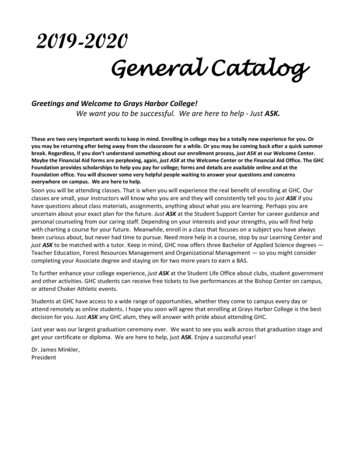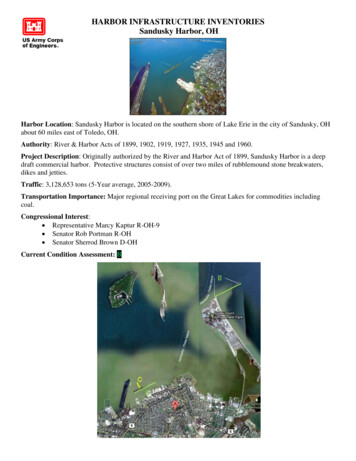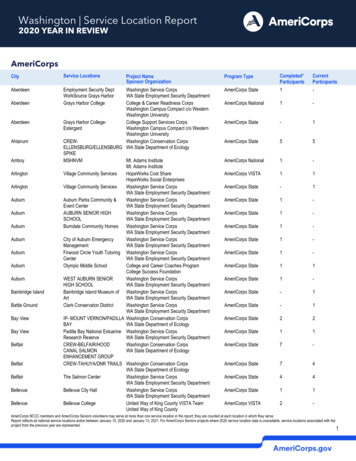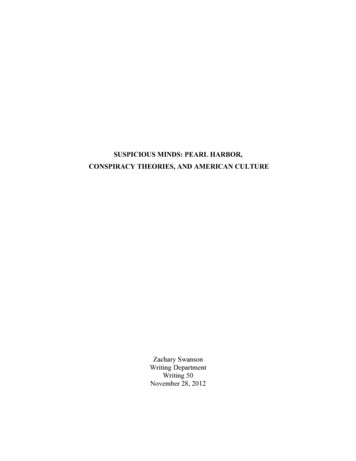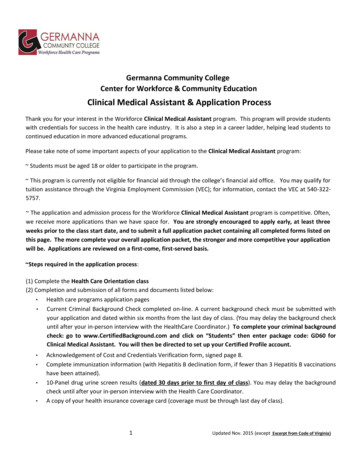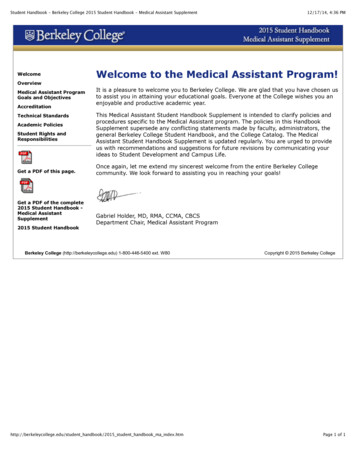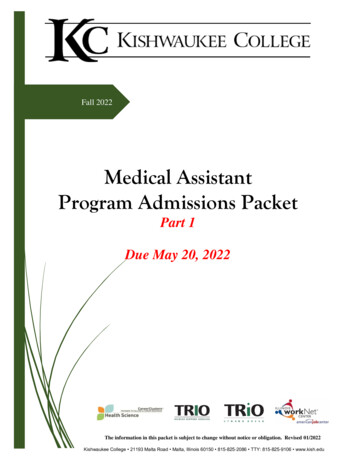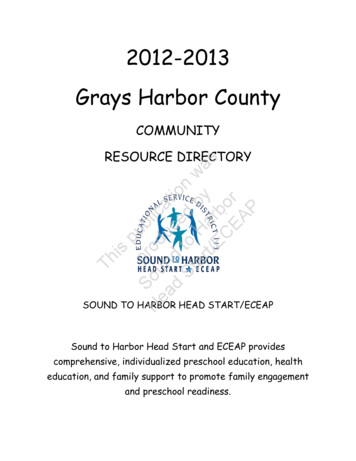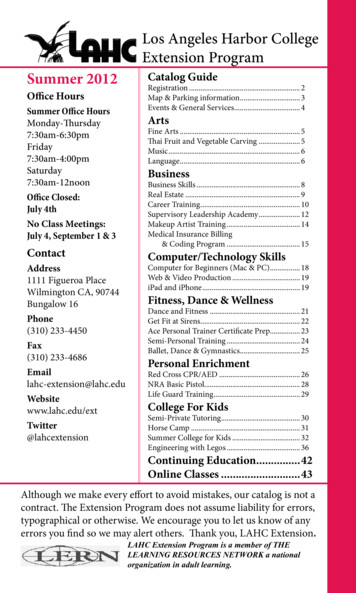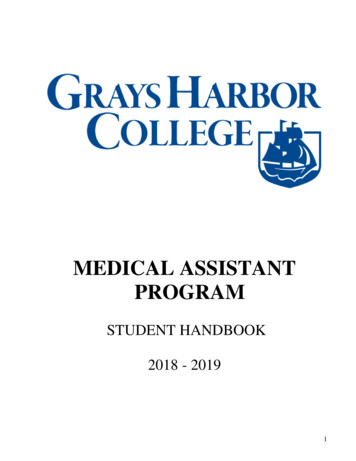
Transcription
I IA RROROLLEGE-MEDICAL ASSISTANTPROGRAMSTUDENT HANDBOOK2018 - 20191
Grays Harbor CollegeMedical Assistant ProgramProgram IntroductionGrays Harbor College offers a program in the dynamic and challenging field of Medical Assistant.As a member of the health-care team, a Medical Assistant is prepared to perform a broad range ofadministrative and clinical tasks under the delegation of a physician or an ARNP with legalprescriptive authority.Our Medical Assistant Program; an Associate in Science Degree is designed to prepare students forentry-level employment as Medical Assistants in medical offices and related medical facilities.Mission StatementThe mission of the Medical Assistant Program at Grays Harbor College is to provide educational andclinical experiences that are current with medical practice standards for entry level Medical Assistantcompetencies and to instill in the student professional goals of safe and ethical practice with theindividual responsibility of continuing education.PhilosophyMedical Assistants have moral and ethical standards to serve their patients, their employers andtheir coworkers with honesty, confidentiality, respect and use of professional boundaries. It is theresponsibility of the Medical Assistant student to obtain these attributes as well as knowledge andtechnical skills through the education and training offered in the Medical Assistant Program. It is alsothe responsibility of the student to gain personal and professional growth while in the program and acommitment to continue their education, and personal and professional growth while practicing theMedical Assistant profession.Education GoalThe ultimate educational goal of the Medical Assistant Program of Grays Harbor College is toprovide the community with well-prepared, well-informed, professional Medical Assistants who arecapable of providing quality patient care under the delegation of a physician or an ARNP with legalprescriptive authority.Program curricula are designed and maintained for students to achieve entry level competencies asset forth by the CAAHEP 2015 Standards and Guidelines for the Accreditation of Medical AssistantEducational Programs. CAAHEP accreditation focuses on reviewing programs based upon theiroutcomes.Accreditation, Standards & GuidelinesGrays Harbor College is accredited through the Northwest Commission on Colleges and Universities(NCCU).The Medical Assistant Program is applying for accreditation by the Commission on Accreditation ofAllied Health Education Programs (CAAHEP) upon the recommendation of the Medical AssistantEducational Review Board (MAERB).Address:Commission on Accreditation of Allied Health Education Programs,25400 U.S. Highway 19 North, Suite 158Clearwater, FL 33763(727) 210-2350www.caahep.org2
CAAHEP accreditation qualifies program graduates to sit for the national certification examination toobtain the Certified Medical Assistant (CMA) credentials.GHC’s Medical Assistant Program is in accordance with the standards, guidelines, and/or essentialsof: Grays Harbor College Washington State Laws, rules, and regulations relating to the registration and certification ofhealth-care assistants (HCA Law) governed by the Department of Health (DOH)Department of Health; Health Care Assistants LawPO Box 47869Olympia, WA 98504-7869(360) 236-4942 The American Association of Medical Assistants (AAMA)Medical Assisting Educational Review Board (MAERB).20 N. Wacker Drive, Suite 1575Chicago, Il 60606(800) 228-2262 www.doh.wa.govwww.aama-ntl.orgThe Commission on Accreditation of Allied Health Education Programs (CAAHEP)25400 U.S. Highway 19 North, Suite 158Clearwater, FL 33763(727) 210-2350www.caahep.orgNorthwest Commission on Colleges and Universities8060 165th Avenue NE, Suite 100Redmond, WA 98052-3981Phone (425) 558-4224 www.nwccu.org3
Grays Harbor CollegeMedical Assistant ProgramAdvisory Board Committee Members and Program FacultyThe Medical Assisting Program Advisory Board consists of individuals from the medical community,the public, and the college who are involved with and knowledgeable about the profession of medicalassisting and health care.Program Academic AdvisingStudent Academic Faculty Advisor and Program Director for the Medical Assistant Program:Program Director:Office Location:Phone:Email:Chrissie EricksonManspeaker Building 2109(360) 538-4119Chrissie.Erickson@ghc.eduFaculty Hours and Appointment SchedulesFaculty members post a quarterly schedule of office hours and availability for appointments. Thesehours are reserved for advising, assisting, counseling and meeting with students. Please scheduleappointments for meeting with faculty.Current Faculty Contact Information4Program Director:Office Location:Phone:Email:Chrissie Erickson, CMAManspeaker Building 2109(360) 538-4119Chrissie.Erickson@ghc.eduMA Instructor:Andrea Conley, CMAOffice Location:Phone:Email:Manspeaker Building 2109(360) 538-4120andrea.conley@ghc.eduTwin Harbor Faculty:Office Location:Phone:Email:Lindsey Kargbo, RN MSNAberdeen High School(360) 292-8690lkargbo@asd5.org
GHC Facilities and ServicesCounseling and AdvisingThe primary goal of GHC's Counseling Services is to provide the necessary academic and personalsupport to enable students to succeed at college. Short-term personal counseling is available tostudents who are experiencing difficulties that may be interfering with their educational progress.Counseling emphasis is on providing support, clarifying choices, handling difficult situations, andaccessing community resources. Confidential assistance is available for a variety of concernsincluding: College transitionCareer planningAcademic success strategiesProblem solving and decision makingSupport for problems resulting from chemical dependencyReferral to community support servicesFinancial ServicesFinancial aid is available to students based on demonstration of need. The types of financialassistance available are outlined in the GHC catalog. Students can call or contact the Financial AidOffice at (360) 538-4018 or the 100 Building.Services Available to StudentsLibraryMany assignments will require the use of the college library. Medical Assistant students shouldbecome familiar with the services offered by the library, which is located at the 1500 Building.Learning CenterThe college Academic Skills Center offers skills development and tutoring in a variety of subjects,such as math and writing.Writing CenterWriting skills are required throughout the Medical Assistant Program coursework and are necessarythroughout the profession of medical assisting. The college offers free services at the Writing Centerto improve writing skills.Math CenterMath skills are required for the bookkeeping course and calculating medication doses as well asother areas within the Medical Assistant Program. The college offers free services at the MathCenter to improve math skills. Medical Assistant students are encouraged to take advantage of thisservice.Policies and ProceduresStudent Rights and ResponsibilitiesPersonal and professional ethics are qualities essential in the practice of medical assisting andexpected of each student attending the Medical Assistant Program.Medical Assistant Program students are expected to demonstrate these qualities and abide byfollowing the expectations as outlined in the “Student Rights and Responsibilities” section 407 of theGHC Catalog. In addition, Medical Assistant Program students are expected to demonstrate5
leadership among their peers by assisting others to follow the policies. Confidential and privatereporting of violations to the program director is encouraged.Violations may result in disciplinary action up to and including probation or dismissal from theprogram. Medical Assisting is an extremely ethical profession and no persons with unethicalbehavior and attitudes should enter into the profession. Violations are taken very seriously.Any student violating college policy dealing with cheating, plagiarism and forgery or alteration ofrecords will be subject to the following disciplinary actions: Any student giving and/or receiving unauthorized assistance from any person, paper, orobject on any test, quiz, lab competency check, or assignment, or who fails to use properdocumentation of sources/references in written assignments will receive a grade of zero forthe quiz, test, competence, or assignment, regardless of the value/weight of the grade, andwill be placed on program probation.6
Equal OpportunityThe Medical Assistant Program strives to uphold the Equal Opportunity Policy of the college. Pleasesee the GHC Catalog under College Policies for further information. While discrimination of studentsand faculty is discouraged, all persons involved with the Medical Assistant Program are expected touphold the standards set forth by the college and the program.Professional ActivitiesMembership in the American Association of Medical Assistants (AAMA) is recommended but notrequired as a requisite for program enrollment. The second year of the Medical Assistant Programstudents will be required to obtain membership. The AAMA is instrumental in providing professionaldevelopment for the Medical Assistant after graduation from the program by providing networkingresources and continuing education for certification requirements.Dress Code and AppearanceAttire while attending classes is expected to be casual to professional. Clothes must be clean andappropriate for a professional setting. Open toed shoes are not allowed in the lab at any time.Scrub uniforms must be obtained and must be worn on the designated lab days and competencytest days. Each student will be issued a name badge, which is to be worn as a part of the uniform.In addition, the name badges should be worn to any program related professional meeting, seminar,workshop, or activity or whenever guest speakers are presenting.Appearance is an important part of a professional image and safety in a medical setting. Hair mustbe clean and controlled (tied back during labs); fingernails must be clean, in good shape and ofreasonable length. Polish is discouraged due to sanitation concerns.Tattoos must be covered and facial jewelry removed during competency test days and during theexternship.During labs, excessive jewelry must not be worn. Watches, wedding rings, and small non-danglingearrings may be worn. These restrictions are for both student and “patient” safety and are goodhabits to establish for workplace preparation.Smoking and Other Strong OdorsBody odor, either from smoking or perfumes, is difficult, if not impossible for many people to tolerate.If a complaint arises about your odor you will be counseled and an appropriate action will beimplemented. Smoking is strongly discouraged due to health concerns, as well as odor.Personal HygieneCleanliness is a must. Body odor, malodorous breath, poor oral care, unclean nails, skin, or hair areall symptoms of poor hygiene. You will be counseled if lack of cleanliness is a concern.Written WarningsProfessionalism is a requirement in health care. If noncompliant with the handbook requirements ofthe program or professionalism standards of a clinical site, students may receive a written warning.The program director and the Dean of Workforce will keep a copy of these warnings in a temporarystudent file. Repeated offense and/or safety violations will require a corrective action plan and mayreceive disciplinary action, including up to dismissal of the program.7
Attendance, Tardiness & Leaving Class Early RequirementsExcellent attendance is critical to your success in the program and part of a good work ethic.Outside appointments should be scheduled during non-class times. Students should haveemergency back-up plans to avoid missing class.Should you have to miss a class, you will need to contact the instructor for handouts, assignmentsand information missed. The instructor should be notified 48 hours prior to the class/day you will bemissing to make arrangements for make ups. You are to contact the instructor via email. (Seesyllabus for “How to Email College Instructor”). GHC has established that good attendance isinstrumental in helping to develop your professional responsibilities and you must be aware of theneed for excellent attendance while employed as a Medical Assistant.Excusal PassesStudents will receive two (2) excusal passes per quarter. Students can use passes for pre-arrangedabsences and appointments 48 hours before their absence. Passes can also be used for unplannedfamily emergencies, sick days, tardies, early releases or unplanned events. Once redeemed, thepass will be given to the instructor and no points will be deducted from students’ grade.If a student has their passes remaining at the end of the quarter they are allowed to turn in for fiveadditional points per pass.Absences, Tardies & Leaving Class EarlyAttendance is an integral element of your final grade evaluation. Roll will be taken at each classmeeting session. Tardiness/Leaving Class Early is a poor work habit and is disruptive to the class.When entering a class late or leaving early, you must be respectful of the students that have arrivedon time and be quiet when entering/leaving the class. Class begins promptly at the time designatedand ends as scheduled. Students who arrive after the designated time will be marked tardy.Students who leave before class is scheduled to end will be marked as leaving early. GHCencourages responsible time management and we urge the student to establish good work habits.Two (2) absence(s)/tardies/leaving class early during the quarter will not affect your final grade;however, more than two (2) pre-arranged and/or not pre-arranged absence(s)/tardies and/or leavingclass early will result in the loss of a grade of one level per absence/tardy/leaving class early.DeductionsIf a student is absent or tardy on an exam/competency day, the student will need to arrange a timeto make up the exam/competency. 10% will be deducted from all exams and 50% from allcompetencies when student makes up.Non-ComplianceMore than the two allotted pre-arranged absences, tardies or leaving class early will require acounseling session with the program director, will be reflected in your grade and a Written Warninggiven to the Dean of Workforce at GHC. Continued absences, tardies or leaving class early mayresult in probation or dismissal from the program.Sickness, Family Emergencies, Other Unplanned EventsSicknesses, family emergencies and other unplanned events resulting in absences greater than two(2) will require written documentation to return to class. Each situation will be evaluated by theProgram Director and the Dean of Workforce.8
Competencies/Skill TestingAll lab competencies/skill testing must be completed by the end of the course. Failure to properlylearn lab skills may result in a failing grade.Phone UsePersonal use cellphones should not be turned on in the classroom or visible. If you are expecting anemergency call; notify the instructor and you will receive permission to have your phone on vibrateduring class. If you receive a call, please step out of the room. Outgoing calls/texts are not to bemade in the classroom or in the lab. Emergency calls are available at no charge by dialing 9-911from any classroom phone.In the event that a cellphone is being used during designated class time the student will receive averbal warning. The next offense will result in a formal Written Warning and given to the Dean ofWorkforce. The second offense will result in a grade deduction. For example: B to a B grade.Use of the Medical Assistant LabSafety is a major concern in the lab and therefore the rules will be strictly enforced. More specificrules regarding blood borne pathogens will be provided as part of your clinical courses. Here aresome general rules: Open toed shoes will not be allowed during lab classes. We are often working with needles,surgical instruments and other sharp tools that could be dropped and chemicals, which couldbe spilled. Children are never allowed in the lab at any time. Even on non-lab days, we have manysharp items, electrical equipment, chemicals, and other potentially dangerous types ofsupplies and tools as well as biohazard waste. Non-program adults are allowed in the lab by invitation (permission) only. Of course, collegeemployees, such as maintenance, administrators, faculty and staff are permitted withappropriate college business. College equipment and supplies are not for personal use. Please respect our property. Nosupplies or equipment may be removed from the lab. Some equipment and references maybe checked out with permission from the Program Director; check-out forms are provided forthat purpose. Drinks are allowed on the main tables only during certain times. This includes waterbottles, coffee cups, etc. Drinks must have non-spill lids on at all times.In Class ParticipationParticipating in class discussions is an important part of your learning experience. You will be calledupon in random order and you will be expected to participate. During group activities, equalparticipation among all members on the group is required.Lab participation means being prepared, making good use of lab time and staying on task. If you donot attend your schedule labs and/or do not make effective use of lab time, you cannot expect to beprovided additional time to complete your competencies. All competencies must be completed in thequarter in which they are assigned.9
Program Supplies Scrubs and appropriate nonskid shoesGeneric school supplies (pen, paper, assignment book, etc)Book carrier (back pack or case on wheels)StethoscopeWatch with a second handOptional: Flash drive or other storage mediaExternship RequirementsPrior to Externship, students must have completed all required program courses with “B-” or bettergrade. A physical exam and required immunizations must be up to date (including PPD), CPR andFirst Aid Certificates must be current, and seven hours of Hepatitis and HIV/AIDS certification (this iscovered in the MEDAS 132 Medical Office Safety and Emergencies, and in MEDAS 135 MedicalLab Procedures I courses). Students are placed into medical facilities as arranged by the externcoordinator. A current criminal background check is also required. Placement decisions are basedon student personality and abilities and clinic preferences. All students are required to apply skills inboth administrative/clerical/front office and in the clinical/back office. At least half the Externshiphours should be applied to a family practice or similar general setting. The other half may be spent ina specialty practice. Student references are considered if appropriate. Out of area placement ispossible with special arrangements.Graduation RequirementsStudents should apply for graduation during the quarter prior to your expected date ofcompletion. All courses must be completed with a C or better grade prior to graduation. Otherrequirements may be found in the GHC Catalog under “Graduation Requirements”. It is theresponsibility of the student to file an application for graduation.10
Student Health Services, Health Requirements, and Occupational HazardsAlthough many faculty and staff are trained in emergency CPR and First Aid, please note thatroutine and urgent medical services are not available for students on campus. Emergency medicalcare is available through our city EMS 911 services.Grays Harbor College is located within five miles of a full service hospital and many medical facilitiesand services. Occupational Exposures - The medical assistant may be exposed to various chemicals used indisinfecting and sterilization, laboratory testing reagents, biohazard waste and blood bornepathogens, and communicable diseases. While in the Medical Assistant Program students havesimilar occupational exposures. Refer to the Informed Consent for Coursework RequiringHuman Subjects document in this packet for specific information. Safety issues and concernswhen dealing with occupational exposures are a major focus within the Medical AssistantProgram curriculum. OSHA and WSHA Standards are strictly adhered to at all times in thelaboratory and/or clinical settings. Immunizations and tuberculosis screening are required in accordance with CDCrecommendations for health care workers. Refer to the Immunization Policy document in thispacket for specific immunization and tuberculosis screening requirements. While a physical exam is not required for admission into the Medical Assistant Program, studentsmust be physically capable of accurately and safely performing the tasks within the program andwithin the profession. The student should self-assess these abilities prior to entering the MedicalAssistant Program and recognize that any limitations may directly affect their ability to succeed inthe program and in the profession. While attending Grays Harbor College, students who wishspecial support services are expected to self-identify. Students with disabilities requiring auxiliaryaids, services, or other accommodations should contact the Disability support Services. See theGHC catalog for further details.Body Mechanics and MobilityMedical assistants should be able to lift and/or carry a minimum of 20 pounds and have the ability tostand, sit, and bend over, squat, and walk for prolonged and intermittent periods. The medicalassistant may be required to sit at a reception desk and/or at a computer terminal for prolongedperiods of time and to reach a computer keyboard or phone while sitting. Prolonged and intermittentuse of the telephone and keyboard may also be required. Adequate range of motion of joints for thesafe and competent performance of duties is required.Vision, Hearing and Sense of SmellThe senses of vision, hearing and smell should be within normal ranges. Corrective devices may beutilized as needed for the safe and competent performance of duties.Professional CharacteristicsCommunication SkillsThe medical assistant must be able to read, write, and clearly speak English. You are also requiredto be able to understand verbal instructions. These communication skills as well as the ability tocommunicate with people who do not speak English, people from diverse cultures, people withcompromised abilities to communicate, and people who are developmentally delayed and/ordisabled are further developed within the Medical Assistant program. Verbal and nonverbalcommunication skills must be sufficient to effectively instruct/teach patients, participate in teamdiscussions, deliver and receive information to physician employers and patients, respondappropriately to questions and instructions. Clear communication skills are critical to student successwithin the program and the profession.11
Multi-Tasking AbilityThe ability to accomplish multiple tasks simultaneously, accurately, and safely is a necessary skill forMedical Assistant. Multi-tasking requires the ability to organize and prioritize tasks, manage time,and arrange the work area for maximum efficiency. The ability to be flexible in attitude and adapt tochange is also necessary.Confidentiality, Honesty and TrustworthinessMedical assisting requires the ability to handle sensitive personal and business information withutmost confidentiality. In addition, Medical Assistants also need to be completely trustworthy andhonest with money, medications, and property.Behavior, Social and Interpersonal Skills, Professionalism and BoundariesMedical Assistants must be emotionally healthy and stable and be able to practice sound judgment.Stressful situations must be handled on a daily basis in a professional manner. Interpersonal skillsmust be adequate to acknowledge and respect individual values and opinions and maintain goodworking relationships with employers, co-workers, supervisors, staff and patients. Individuals mustbe able to evaluate their own abilities, needs and limitations. Professional boundaries must beunderstood and respected. While these professional characteristics and skills arereinforced continually within the Medical Assistant Program, the inability to obtainthese attributes may lead to probation, dismissal, loss of employment opportunities,and may even have legal consequences.Critical Thinking and Problem Solving SkillsCritical thinking abilities are important as well as the ability to problem-solve a variety of situations.You will be taught to think through situations and come up with viable solutions. Many of you alreadyhave this ability and some of you will learn and/or improve on your problem solving skills. You willrecognize the critical thinking exercises when your questions are sometimes reverted back to you forfurther insight, perhaps you will be asked to work through a set of options, most often yourinstructors will facilitate a dialog that will help you examine various solutions/options and the benefitsor drawbacks of decisions. This can be a frustrating learning process at first because you might justwant a quick answer, but it will become easier and more natural as you utilize these skills more.Washington’s Health Care Assistant LawThe Health Care Assistant Law of Washington State regulates invasive procedures performed bynon-licensed health care professionals. Medical Assistants are covered under this law as well asmany other health care professionals. The law contains specific education requirements in order toqualify for each category. Links to the Health Care Assistant Law are provided through theWashington State Society of Medical Assistants official website at www.wssma.org.The categories of the HCA Law are as follows:Category A - may perform venous and capillary invasive procedures for blood withdrawalCategory B – may perform arterial invasive procedures for blood withdrawalCategory C – may perform intradermal, subcutaneous, and intramuscular injections of diagnosticagents and administer skin tests.Category D – may perform intravenous injections of diagnostic agentsCategory E – may perform intradermal, subcutaneous, and intramuscular injections of therapeuticagents12
Category F – may perform intravenous injections of therapeutic agentsCategory G – may perform hemodialysisSuccessful completion of GHC’s Medical Assistant Program qualifies the graduate forCategories A, C, and E. Qualifications for Categories B, D, F and G may be obtained throughadditional coursework.Employment OutlookRefer to https://www.onetonline.org/link/summary/31-9092.00 for employment outlook in Washingtonstate and throughout the nation.National Certification for the Medical AssistantThe credential of the Certified Medical Assistant (CMA) is obtained by first graduating from aCAAHEP or ABHES Accredited program (GHC’s Medical Assistant Program is CAAHEP Accredited)and then passing the American Association of Medical Assistants (AAMA) National Board Exam.The exam is now offered online through Prometric. Below is the link to the website to set up yourappointment directly with Prometric.Further information, an Exam Application Packet and an Exam Outline are available online throughthe AAMA website at www.aama-ntl.org. Links are also available through the WSSMA website atwww.wssma.org.Certification, once obtained, must be maintained. Recertification must occur every five years eitherby retaking the Certification Exam or by obtaining Continuing Education Units (CEUs). Sixty CEUsare required for recertification. If your Certification is allowed to lapse, you will not be allowed to usethe CMA credential in a professional setting or identify yourself as a CMA until recertification occurs.Recertification, after a lapse, may be obtained with CEUs.Currently, Washington State does not required CMA credentials in order to perform medicalassisting duties, however, most employers are requiring that medical assistants be either certified orcertification eligible (as in the case of newly graduated students). Additionally, the CMA credential isnot required for registration under the Washington State Department of Health’s HCA Law, althoughthe educational requirements of the HCA Categories A, C, and E are well covered in the formaltraining obtained through this Medical Assistant Program. Links to the DOH’s HCA Law are availablethrough www.wssma.orgAdvantages of obtaining and maintaining the CMA credential are explained thoroughly in the AAMAWebsite (www.aama-ntl.org) and in the WSSMA Website (www.wssma.org).13
Additional Support Courses & General EducationThe following are courses required prior to completing the Medical Assistant Program. Studentsuccess throughout the program is dependent on progressively building on prior abilities andknowledge.AreaEnglishMathComputerKnowledge & SkillsPsychologyClassENGL 101 English CompositionOrENGL 150 Vocational/Technical/BusinessBA 104 Business MathCIS 102 Introduction to Microsoft OfficeCredits5 CreditsBTECH 124 Keyboard Skill Building IPSYCH 100 General Psychology2 Credits5 Credits5 Credits3 Credits*All additional support & general education courses, must be passed according to the GHChandbook.14
GRAYS HARBOR COLLEGE - Student ScheduleMEDICAL ASSISTANT – ASSOCIATE OF APPLIED SCIENCE1st Quarter - FallCourse #MEDAS 114MEDAS 131MEDAS 110MEDAS 151Course TitleCreditsMedical Law, Ethics, and Bioethics for Medical AssistantsCommunication Skills for Medical AssistantsHuman Body Structure and Medical Terminology IMedical Office Reception Procedures3355TOTAL QUARTER CREDITS16nd2 Quarter - WinterCourse #MEDAS 111MEDAS 132MEDAS 133Course TitleCreditsHuman Body Functions and Medical Terminology IIMedical Office Safety and EmergenciesExam Room (Clinical) ProceduresTOTAL QUARTER CREDITS3 Quarter - SpringCourse #53513rdMEDAS 152MEDAS 134MEDAS 135Course TitleCreditsMedical Office Business ProceduresHealthcare CalculationsMedical Lab Procedures I535TOTAL QUARTER CREDITS Quarter4 Quarter - FallCourse #Course Title13thIIMEDAS 136MEDAS 153Medical Lab Pro
Our Medical Assistant Program; an Associate in Science Degree is designed to prepare students for entry-level employment as Medical Assistants in medical offices and related medical facilities. Mission Statement . The mission of the Medical Assistant Program at Grays Harbor College is to provide educational and
